Call of Duty: Modern Warfare has some of the most difficult scenes I have ever seen in a video game. When I saw a couple of the scenes during a preview in May, I felt like they went too far. The violence made me more than uncomfortable.
Now that I’ve played the full game (here is my full review), I would add another scene: the waterboarding of a freedom fighter by Russian captors. Taken by themselves, these are scenes that parents should be aware of when they nonchalantly permit underage kids to play the game, ignoring the Mature (17 and older) rating. And yes, this is one of those games where parents should know what their kids are playing.
But for adults, these scenes are no more violent than many things we have seen in HBO shows like Westworld or Game of Thrones. And that is an important comparison to remember, as Modern Warfare has been writing and giving context to its violence more than most of the other games in the series.
Activision studio Infinity Ward invested heavily in the narrative for Modern Warfare’s single-player campaign, which has 14 chapters and about seven hours of gameplay. Viewing them as a whole, I think the story is very well done. But the question remains. Did they have to include those hyper-violent scenes?
June 5th: The AI Audit in NYC
Join us next week in NYC to engage with top executive leaders, delving into strategies for auditing AI models to ensure fairness, optimal performance, and ethical compliance across diverse organizations. Secure your attendance for this exclusive invite-only event.
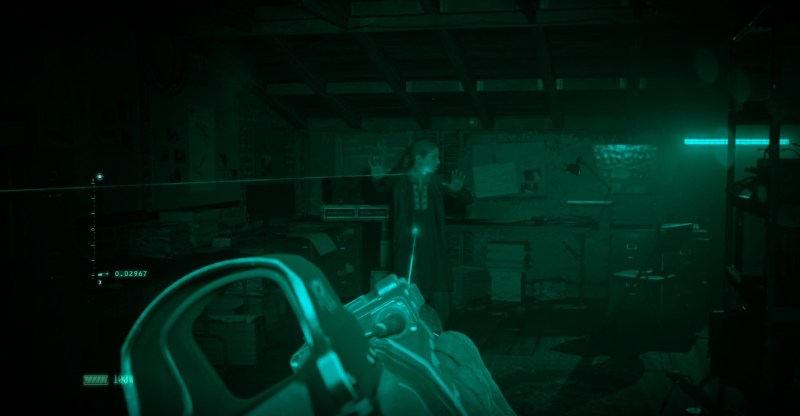
Above: Will you shoot this woman?
These include a Russian chemical weapons attack on a village, where we see dead children and dog, mass executions by Russian soldiers, and a gut-wrenching hand-to-hand combat scene between two children and a Russian soldier, who gunned down the father of the children in cold blood.
In another scene, you go in with a special operations squad to clear a house in London that serves as a terrorist base. You clear the room, one by one, shooting whoever is a threat — whether they are male or female. They are all Middle Eastern, and at least one of them is an unarmed woman. If you don’t shoot them, you may fail your mission.
And in the waterboarding scene, a Russian officer tries to near-drown a woman warrior, Farah, to try to get her to admit that she is a faction leader — a fact that he already knows. One more torture scene you can opt out of. I did so.
After playing the game, I spoke with Taylor Kurosaki, the narrative director at Infinity Ward for Modern Warfare. We discussed all of these scenes, which he said were designed to make you feel uncomfortable and to make you think.
Here’s an edited transcript of our interview.
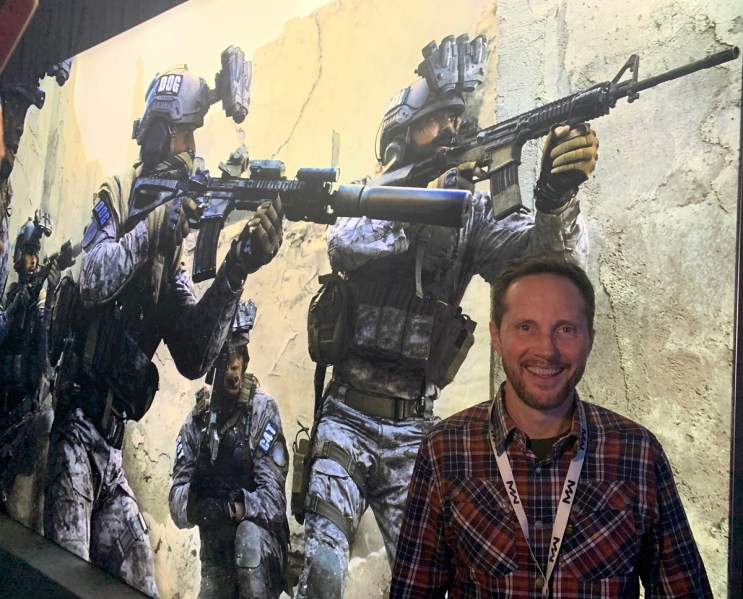
Above: Taylor Kurosaki, the narrative director at Infinity Ward for Call of Duty: Modern Warfare.
GamesBeat: What did you want to do when you got started on this? It wasn’t exactly a remake. More of a reimagining?
Taylor Kurosaki: We looked at it very simply. We said, “What do the words ‘Modern Warfare’ mean in 2019?” We have worked very closely with military consultants. We’ve worked with cultural consultants, folks that have served in the CIA, folks that have been Middle Eastern correspondents. We asked them, “How much has the world changed in the last 12 years?” The time that’s elapsed since Call of Duty 4: Modern Warfare.
They said that the situation on the ground is more complex than it’s ever been. You went from, let’s say, the flashpoint of the war on terror, post-9/11 — that was uniformed armies standing off in big battles with tanks and things like that. In the decade-and-a-half subsequent, it’s now enemies who purposefully try to blend in with civilian populations. The battlefield is not a defined area anymore. It can be anywhere at any time. Consequently, it’s gotten tougher for people who are in these conflict zones to make a change, to be effective.
Our Navy SEAL and former Navy SEAL consultants said it best. They said, “We have imperfect intel, and yet we are expected to act perfectly. We’re expected to achieve perfection. That’s a tough burden for us to carry.”
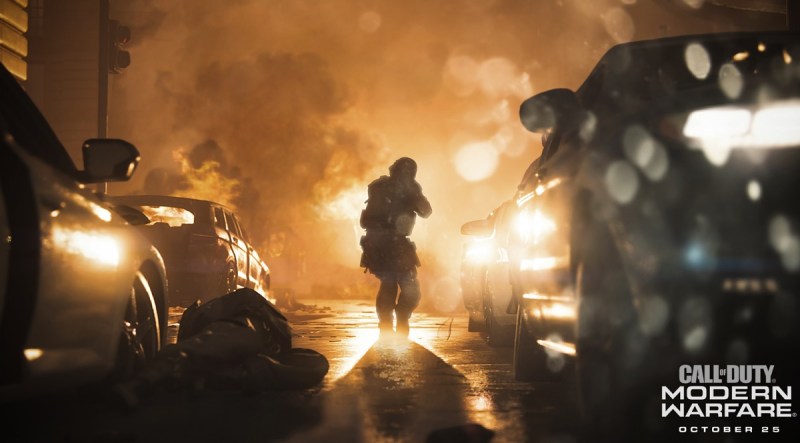
Above: Into the fire.
GamesBeat: You’re starting with this empathy with the soldier’s situation.
Kurosaki: We wanted to have empathy for those guys out there that we know personally, because we work with them, that do their best with imperfect intel and an enemy that tries to make it more complicated as a tactic. That was one thing.
And then on the other hand, because we were inspired by Call of Duty 4: Modern Warfare, one thing that was integral to that game — it wasn’t just about having empathy for these soldiers. Even though Call of Duty 4: Modern Warfare changed perspectives, the perspectives were from an SAS guy to a Marine. As different as those perspectives felt in a gameplay sense, culturally they’re not very different at all. If we were going to call a game Modern Warfare in 2019, we felt like an entirely different perspective that we’d never delved into or played as or played through the point of view of — it was people for whom the war is not something that’s over there. The war is something in their own back yards, in their neighborhoods, splintering their families and their communities.
It wasn’t just about having empathy for soldiers, although again, having empathy for one group — it’s not a zero-sum game. We can have empathy for lots of different people. Empathy not only for the soldiers who have to operate in this complicated environment, but empathy for people whose communities are shattered by conflict as well.
GamesBeat: You had this set of characters from the first game, and you chose to focus in on some of them, if not all of them. It’s kind of a prequel, but not really? Some characters are in there for a reason.
Kurosaki: We keep using the term “reimagining.” What that means is a retelling. It means retaining some of the stuff we love about the original games, but not being beholden to the specific events of the plot. When you go and see a new James Bond film with Daniel Craig, like Casino Royale, they don’t account for every event that happened in Octopussy and Moonraker. But Daniel Craig is still quintessentially Bond. That’s the way we looked at it. In those films they reference things in his past that may have been in other films, but it doesn’t mean that you’re supposed to connect all the dots.
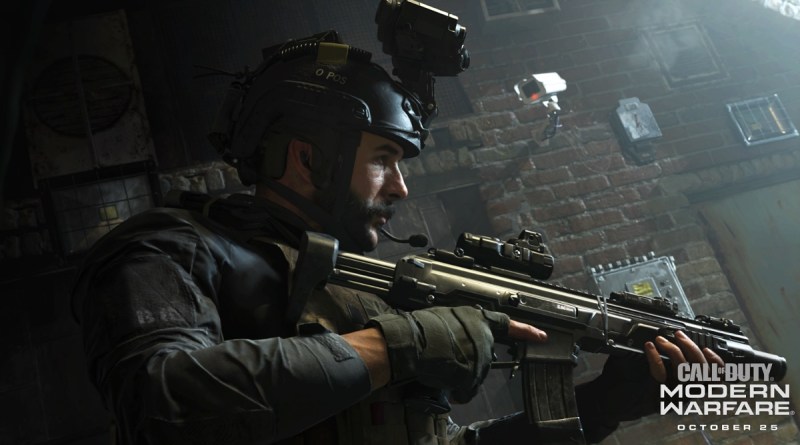
Above: Captain Price leads the way.
GamesBeat: Was Price always this guy who’ll push the edge and say, you know, the line is wherever you need it to be? I thought that was an interesting line as far as describing how he sees the world.
Kurosaki: What he means by that, just to be clear — he doesn’t mean there is no line. He’s saying it’s individual to everyone. It’s wherever you need to draw the line, is where the line is. Where you draw your line may be different from where I draw my line.
GamesBeat: But it’s in a conversation where he’s pushing the limits and Kyle is not as willing. I thought it was interesting there. You’re also putting the player in that position, being Kyle. Where’s my line? The scene where you go interrogate, you give the player that choice. What was some of that intention there?
Kurosaki: We never decouple narrative from design, from gameplay, from mechanics, from the experience of playing the game. Those things are inextricably linked. That’s good game design and good narrative design in games. One is inspired by the other and vice versa. If we have a story that, thematically, is asking where one draws the line — that question is posed to all the characters in our cast — to Farah, to Hadir, to the Wolf, to Kyle, to Price. Again, Price sums it up well. It’s different for everyone. If that’s our thematic, that’s our thesis, our question we’re asking of our players, they have to experience that on the stick, as we say.
GamesBeat: I chose not to participate in the interrogation. I wondered, does everyone go that way?
Kurosaki: I can’t remember if you’re the second or third person I’ve spoken with today who chose not to. That’s a totally valid choice.
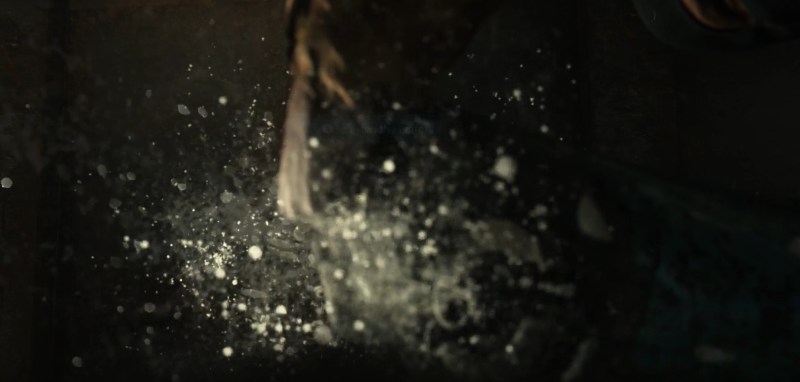
Above: What you see when you are waterboarded by Russian guards in Modern Warfare.
GamesBeat: It fit in the context, too, for me — seeing a scene of torture was very uncomfortable for me. I didn’t want to do another one of those, even if I might miss something that might be there, a part of the story.
Kurosaki: It’s totally valid to make that choice. I think for Kyle, in that position, that would be a very hard choice for him to make. I can see circumstances where — I could see him going either way.
GamesBeat: As game developers I think you did something right there. You’re walking a very fine line. You want to convey all these things are true about war, but you don’t necessarily have to show everything. Giving the player the choice to see or not see some of this is a good one. That was the way the No Russian was, where players had that choice to either turn it off or watch it. Did that feel like it was a similar thinking that tied these together?
Kurosaki: Comparing it to No Russian specifically, you mean? Or just giving players those choices?
GamesBeat: Recognizing that there is extremity in this story that …
Kurosaki: Yeah, if the question we’re asking our players is, where does one draw the line in these morally complex, convoluted conflict zones, then we have to allow our players to make some of those choices themselves.
GamesBeat: There’s been controversy, some of it started by me, about the different scenes. There’s now the torture scene to consider as well. There’s clearing the house, and the kid scene too. Can you talk about those and how the context made you feel like these were essential parts of what you were trying to say with the story?
Kurosaki: Let’s take them individually, and chronologically. Operation Clean House is one of the ones that you cited, back during one of our events, as being potentially problematic. What I would say to that, now that we’ve seen that in context, is that you have a character, Kyle. When we first meet him he’s on anti-terror duty in Piccadilly Circus. He’s getting orders from command: “Do not turn London into a war zone.” Basically, you’re only allowed to engage if the enemy engages first.
That strategy, those rules of engagement, result in a lot of innocent people losing their lives in that terror attack in Piccadilly. He says to Price, I’m paraphrasing, “How do we have any chance of making a difference when we fight with these restrictive rules of engagement? We’re clearly fighting an enemy who doesn’t abide by any rules of engagement on their side, so how can we possibly stand a chance?”
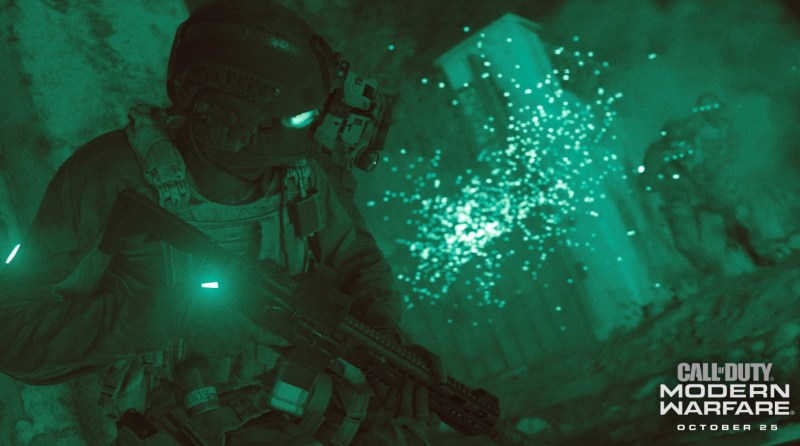
Above: Activision’s Call of Duty: Modern Warfare debuts on October 25.
GamesBeat: I wondered, too, if Price chose him to participate because he knew he felt that way. I felt that subtly there was….
Kurosaki: Price would certainly understand a guy who feels that way. I bet Price has been in that situation himself. But I think the moment — if Price is saying, “I can empathize with this guy,” the moment Price decides to take him with him is when Kyle says, “We’ve been tracking this cell for weeks.” And so the implication there being that if Kyle were somewhat untethered from these ROE, he might have been able to prevent an attack like this. Certainly he could prevent future attacks. Price asks if he has intel on them and Kyle says, “Yes, quite a bit sir.” That’s when he says, “Okay, you’re with me.”
You have a guy that’s said, “I want to protect people. I want to be effective in protecting people. I can’t be as effective as I need to be fighting with one arm tied behind my back.” Price says, basically, “I’m a guy who can maybe untie your other arm.” Operation Clean House exemplifies that. This what happens when you have a guy like Price who, I assume, off screen, is pulling strings, making phone calls, getting authorization to do things that Kyle couldn’t get authorized to do. This is being untethered personified.
It doesn’t mean you do whatever you want. You still have to comport yourself like a trained operative who is not a murderer. The way our Navy SEAL consultants talk about it, they don’t talk about good guys and bad guys. They talk about threats, unknowns. These are the concepts they mention. If you injure or harm someone who has proven themselves to not be a threat, at the very least you’re going to be very strongly admonished by your squadmates. That happens in Operation Clean House if you’re not exercising the appropriate amount of trigger discipline.
Forward of that, if you continue to display behavior that’s unbecoming of someone in that position, you don’t get to continue playing. Your game does its own version of something analogous to being court-martialed or arrested.
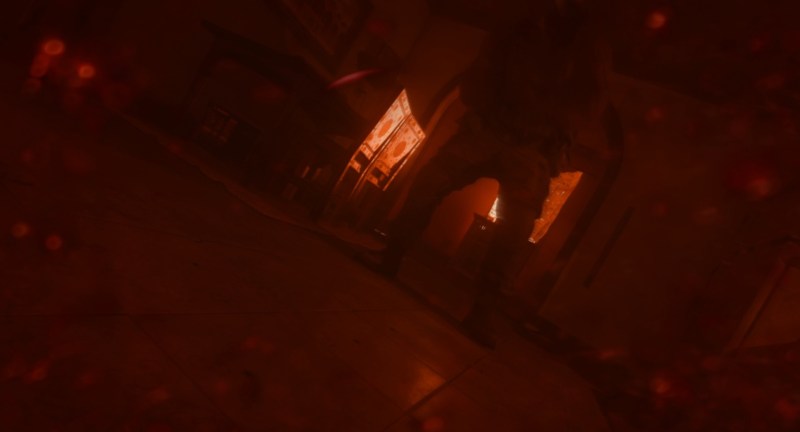
Above: This is what you see when a Russian soldier kills a child in combat.
GamesBeat: It was interesting that in the house-clearing mission, you guys are exhibiting some of this control over the player, in that — what’s allowable and what’s not. What you choose to allow the player to do is a very big decision. The woman runs for the baby, you can’t shoot, because the developer controls that. There are other points where you do let the player use their discretion.
Kurosaki: We try to use a kind of — what’s the right way to put it? We’re not just deciding on a case by case basis. We’re using heuristics. We have a whole bunch of factors that go into whether or not we believe that this is simply a case of an error, being too trigger-happy, versus behaving in a way that’s unbecoming.
We do a lot of things in terms of — how long is someone on screen? Are they in close proximity to an armed enemy? Have they demonstrated, through their body language, a reasonable amount of not being a threat? It’s not as if we’ve decided that this is a person you can shoot and this is a person you can’t. Every case, we’re running a whole bunch of tests. Another way to put it is that we aren’t playing god. We’ve worked hard at developing those heuristics.
For example, I happened to be watching over your shoulder when you were in the embassy mission at the very end, where Stacy is being held at gunpoint by an enemy who’s using her as a human shield. You took out the enemy and Stacy lived. If you had hit Stacy, the game wouldn’t have penalized you, because in that circumstance we’ve deemed that there’s a very probable chance that you are trying your best to take out the enemy. The proximity they have to each other is such that — again, it’s imperfect intel, an imperfect situation.
GamesBeat: Would the game progress if she died?
Kurosaki: Yes.
GamesBeat: I wonder, though, can you cause the mission to fail at that point, because you failed to protect her?
Kurosaki: No, because in that case protecting her is not the mission. We playtest these games tremendously. We don’t see players pushing on the system, testing the system, trying to — we see players who are invested in the story, invested in the characters, who are along for the ride and who are trying their best.
Again, we do run tests. The game is running tests behind the scenes where we can — it’s impossible, with 100 percent certainty, to determine what the player’s intent is in a video game. However, using various metrics, like how quickly a character is moving across the screen, how long they’ve been on screen, how long it’s been since an enemy has been shooting at you, whether an enemy is shooting at you at the same time, we can determine with reasonable certainty whether or not you’re behaving like someone who deserves to have the job you have in this game.
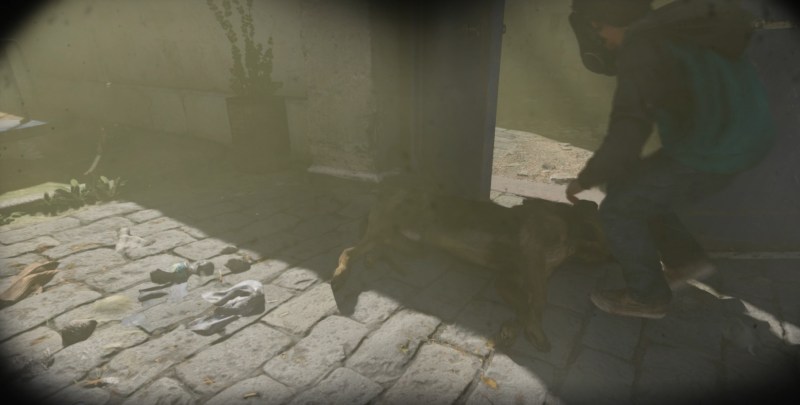
Above: Even dogs can’t escape the deadly gas attack.
GamesBeat: What was interesting to me when I wrote about this and got a lot of negative reaction from fans — it had to do with what my assumptions and what everyone else’s assumptions are about what games are. If you think this is a game that a bunch of kids are going to play and they’ll have fun shooting a lot of innocent people — if you make that assumption, then you judge this to be inappropriate. But if it’s like something on TV like, say, Game of Thrones — there are things that happen on that show where nobody intends for kids to see and think about that. It’s not a show for kids. But because it’s a game, there’s this assumption that kids will play it. It’s an interesting conversation above this as far as how people perceive games.
Kurosaki: Even using the word “games …”
GamesBeat: It’s a strange term for what you guys have done.
Kurosaki: Exactly. Because a game is like Bejeweled. That’s a game. Super Mario Maker is a game. Call of Duty is also called a game, but calling those things all games is like equating the Teletubbies with Game of Thrones. They’re both TV shows, but no one mistakes one for the other, and no one thinks that, as you said, Game of Thrones should be on PBS Kids in the afternoon.
I subscribe to HBO, and I can watch Fraggle Rock, or I can watch Game of Thrones. I’m glad I have those choices, because I can watch Fraggle Rock with my son, and I can watch Game of Thrones with my wife. But we don’t ask whether it’s responsible and appropriate to make Game of Thrones.
GamesBeat: I think some of my worry earlier was about not knowing some of the intention and the absolute control of the controller. Before it was shown to me.
Kurosaki: Right. You just watch the playthrough.
GamesBeat: I think at the end of the clearing I didn’t actually shoot. It was Price who shot.
Kurosaki: Yeah, yeah.
GamesBeat: I paused and then the shots already happened. But for someone watching that, it looks like that’s something the player has agency over. And they do, but — I think some players don’t necessarily like it if you force them to make a choice they don’t want to make in order to progress the story. A player like me, who’d like to have the agency of doing the good thing or the bad thing, I want to decide that. In certain situations, like with Stacy, I chose to shoot. In the other one, that’s as tough a situation you can set up as I can imagine. She’s unarmed, but she’s going to cause a lot of harm if she makes it to her destination.
Kurosaki: Again, just to go back to what you said a second ago, kids playing this game getting to do whatever they want — when we design these games, we always talk about an affordance. An affordance for this, an affordance for that. There is no affordance in a game like this for a player that’s not comporting themselves appropriately. It would never be allowed to stand. If you were on an operation and you didn’t behave appropriately, like you’re trained to do, you’d be kicked out. It would be over.
That’s the fiction we go with. There is no circumstance where a player can just have it at it. But we do allow for imperfect intel, enemies who are using dastardly tactics — again, we’re going for that empathy toward soldiers who are having to do their best under those circumstances.
And then chronologically the next one would be Farah’s scene.
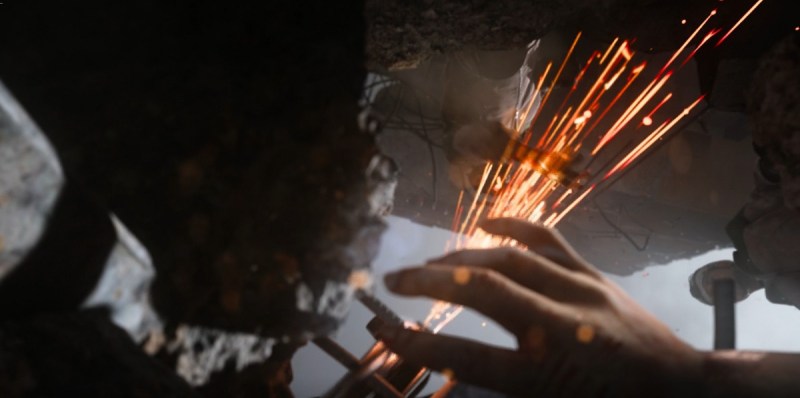
Above: The White Helmets rescue a trapped child in Modern Warfare.
GamesBeat: I saw The Last Men in Aleppo, the movie about the White Helmets (who rescue bombing victims and identify themselves as non-combatants with white helmets). It was very evocative of what they have to go through in that very quick scene, what this is like. That was one of those things that felt very real to me. What does Modern Warfare mean in 2019? It’s people having to dig people out of the rubble.
Kurosaki: We’ve watched that documentary, and a lot of documentaries like that. Speaking for myself, as a father of a young child, those things are very hard to watch. I think they’re important to watch. It certainly gives me perspective on the privilege that I have. I just can’t imagine being in a circumstance where I couldn’t protect my son, where it was out of my control. I don’t think there is a ton of awareness of the true cost of war, not just for soldiers, but for the people who never asked to be in a conflict zone. The conflict zone came to them.
Because Farah, as a character, is — again, I’m generalizing a bit. Her background is different, certainly, from mine, and I’m going to guess from yours, and probably from 99 percent of the people that play this game. That’s why we go into her backstory. We could all just right now make up backstories for Kyle and Alex and Price. We could draw on inspiration from our own childhoods, or childhoods we’ve seen in things that are related to the kind of world we live in. Those things are less critical to shaping them into the people that they are.
For Farah, in order for you to have empathy for her, and for you to have understanding of what she went through and how it shaped who she is, I think it’s important to see how different her background is from ours. That’s why that’s included.
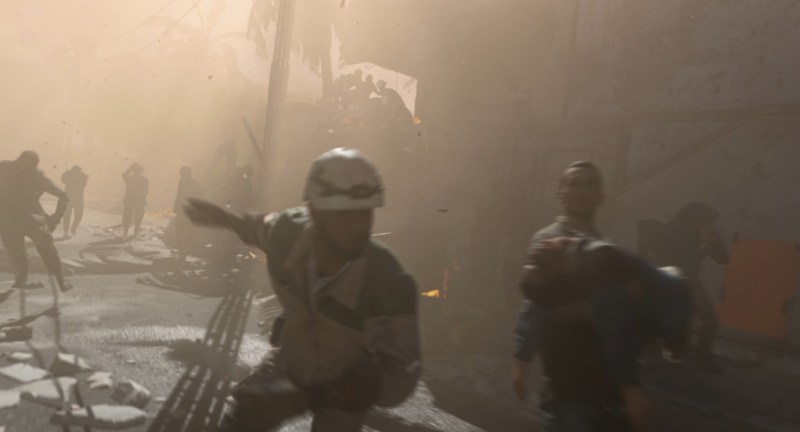
Above: White Helmets fleeing from bombs in Modern Warfare.
GamesBeat: She becomes this very inspiring hero and leader out of this. It seems important to have that kind of character in this kind of game, because we haven’t seen many heroes like that in most western stories.
Kurosaki: I felt it was our responsibility, frankly. The game is not called “Western Warfare.” It’s not GI Joe. It’s Modern Warfare. Her story — stories like that are all too common, and every bit as much a part of what defines that, the soldier’s story today.
GamesBeat: It gets to an interesting situation between Farah and her brother.
Kurosaki: We can talk about that too. When the player in our story — when Alex first meets Farah and Hadir, he says, “I have a problem. I need you to help me with it.” She says — I think she’s taken aback a little bit. Something she says on the heels of that is, “We live like this every day. You’re coming in because you have a big problem, because nerve gas may turn up in London or Paris or New York. We live under the spectre of this every day. Now that it’s important to you, you come to me. But you don’t really know anything about me.” He will, and so will you as you play those flashbacks. But he knows he needs her help on the ground.
Then Hadir comes in and he says, “Oh, this great. This is some help. Alex can help us.” Alex defers and says, “Your sister is in charge. She decides. She’s the commander.” Hadir says, “Yes, my sister is in charge, and the Russians are still occupying our country.” Then he kind of shoots her a look, and she shoots him one back and says….
GamesBeat: Don’t discuss this outside the family. That Godfather thing.
Kurosaki: Yeah. You can tell that there’s tension between the two of them. Right in that moment, you can see that he’s agitating for more action, for more definitive measures.
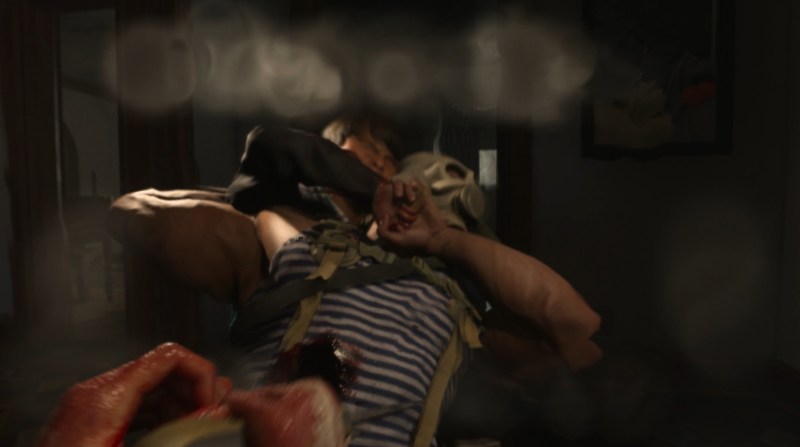
Above: A flashback to children in hand-to-hand combat in Modern Warfare.
GamesBeat: He wants to draw the line farther out there.
Kurosaki: Exactly. And then talking about the flashback mission, Hometown, they’re both participants in that. They’re both there. I think if you look at that mission as a whole and you see the events that they both went through, I think you could extrapolate out that one of them may want to hold on to everything that she defines as shaping her humanity, as strongly as she can, and maybe he wants to do whatever he can to prevent that from happening to someone else’s family.
It’s interesting. This is a little behind the scenes, but when we auditioned the actors who play Farah and Hadir, we had these longer scenes where Alex is talking to each of them individually. There wasn’t actually an Alex at this point, but the character who’s a surrogate for Alex says to Farah, “You’re fighting against enemies who will resort to any means necessary to win. Why don’t you do the same?” She says, “Because even if we win, if we sacrifice who we are, then there’s nothing to fight for. We’ve lost our humanity, lost who we are in the process. What’s the point in winning?”
GamesBeat: She made it clear that she wouldn’t use these weapons, and if you do, you’re her enemy.
Kurosaki: By the same token, we had a moment between Alex and Hadir where Hadir says not the opposite, but he says, “If we don’t also use some of these tactics, we’re going to lose. So then what’s the point either?” His whole thing is, do what’s necessary to win, and if someone’s fighting dirty — if you need to fight dirty to win, then do that, and then we can talk about returning to normalcy.
I don’t think either of those points is necessarily right or wrong. Farah makes the point that you win, but you’ve still lost. From Hadir’s point of view, if you’ve lost, you’ve lost anyway. I don’t know who’s right or wrong in that argument. In the final analysis, they’re kind of both right. The truth is kind of in the middle. Hadir is pushing for more and Farah is resisting. In the end you see that she understands why he’s pushed further, and she’s pushed a little further herself. She changes where her line is. She says, again, “I defend my people here at home.” That’s her line. But she doesn’t necessarily — these characters are not static. They evolve, because circumstances force them to evolve. Her world view at the end of the story is different from her world view at the beginning of the story.
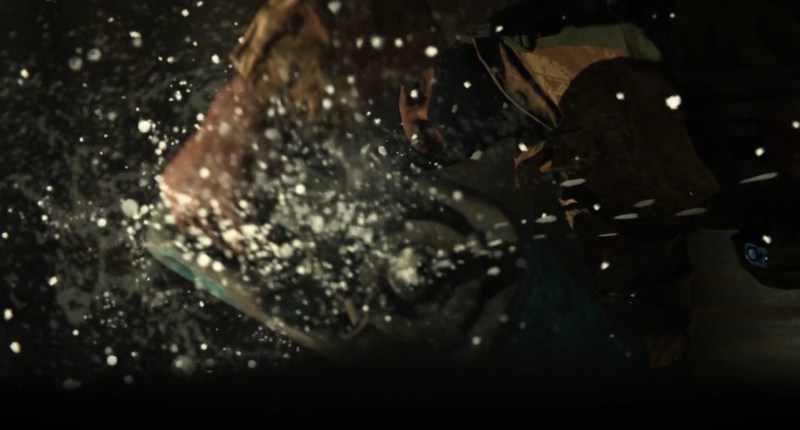
Above: A Russian guard waterboards Farah in Modern Warfare.
GamesBeat: And then scene in which Farah is tortured. There’s a way of doing storytelling where you suggest that’s happened. This one goes down the road of showing you that as it happens. Is there a reason to do it one way or the other?
Kurosaki: Again, I feel like that was — it might not be apparent to someone on their first playthrough, but in the same way that you appreciated the fact that in the end of Clean House, you didn’t have to shoot, you don’t have to participate in that second Farah flashback, in the imprisonment scene. We don’t fail the player if they can’t succeed because — a valid response to someone taking away your liberties and subjecting you to something like that would be shut down, to give in and turn inward.
That is a valid way to interact with that. The game doesn’t make you respond to him. It doesn’t make you succeed in not passing out from the waterboarding. You are able to. But because you’ve seen Farah as a full-fledged leader, and you’ve seen her origin story and where that leader was born, my guess is that most players do want to resist and use everything at their disposal to succeed in that mission, because they feel that’s what Farah would do in that situation.
Maybe I’ve mentioned this before, but we always go for this thing where — we’re looking for an emotional state of parity between our players and the characters they are playing as. If I know I’m playing as Farah, I’m probably going to behave in ways that I believe Farah would behave. Again, not because you think this what you’re supposed to do, but because you’re invested, and because you know enough about her. But I don’t know. If I was in that situation, I might just turtle. That’s a valid way to play that, and the game progresses regardless.
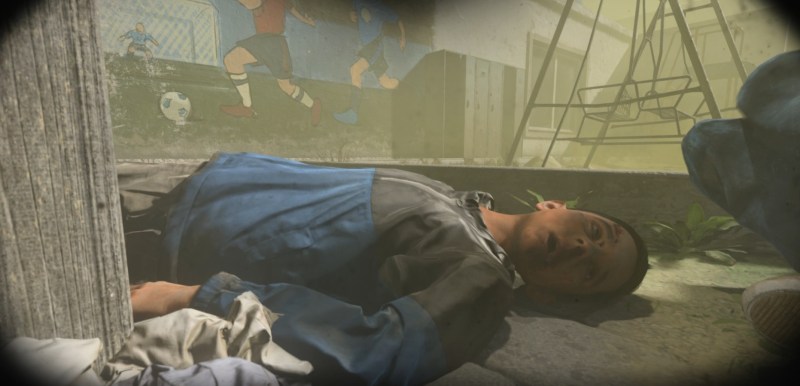
Above: Children are victims of an evil gas attack in Modern Warfare.
GamesBeat: Looking at all of this in context, you can see more reason for why it’s all in there. Do you ever look at it from a point of view of whether something belongs, or whether it might be pushing the line into something gratuitous?
Kurosaki: All the time. In everything we do, we’re always examining that. We have a mantra, a dogma that we’ve followed since day one on this project. It has a bunch of tenets, and one of the tenets — it’s a movie reference. This game is Jaws, not Saw. We would never put something in because it’s shocking. We ask that when team members propose something or have a suggestion or have an idea. We always say, “Yes, but why?” If someone says, “Well, it’s cool, it’s badass,” that’s never a good enough answer.
All of these things are purpose-built because we feel they’re necessary to tell the story. Any time anything doesn’t fit into that, if it feels superfluous, it’s out.
GamesBeat: Call of Duty means so many things to so many people now. There are some who’d say that Call of Duty doesn’t need a story at all. It’s interesting that you want to make something that people enjoy, that’s entertainment, but you’re also trying to make them think, and part of that is making them feel uncomfortable.
Kurosaki: It’s a juggling act, for sure. What I’d say to that — and Pat Kelly, our studio head, has said this before — is that Call of Duty has been around for a long time. With so many outings, it’s almost a genre unto itself. If Call of Duty just means “military,” let’s let it only be that and nothing more. Meaning that in the same way that you have Saving Private Ryan, versus some more visceral, spectacular, bombastic war film — well, those can both live under the Call of Duty umbrella. But it doesn’t mean that everything has to be painted with that brush of bigger, louder, badder, faster, more extreme, always at 11. It could be Band of Brothers. It could be things that are more thought-provoking.
Pat’s said to people who have seen and played the game, and this is what I would say too, “Go in with open eyes. Don’t color this according to every other thing that’s had that moniker on it.” This can be the thinking man’s outing of Call of Duty. That’s what we’ve tried to do. We’ve literally taken the word “Modern Warfare” and said, “Imagine there were no other games with that name, and nothing else called Call of Duty.” If we were going to make our own thing now, fresh, what would we make? And the answer is the thing you just played.
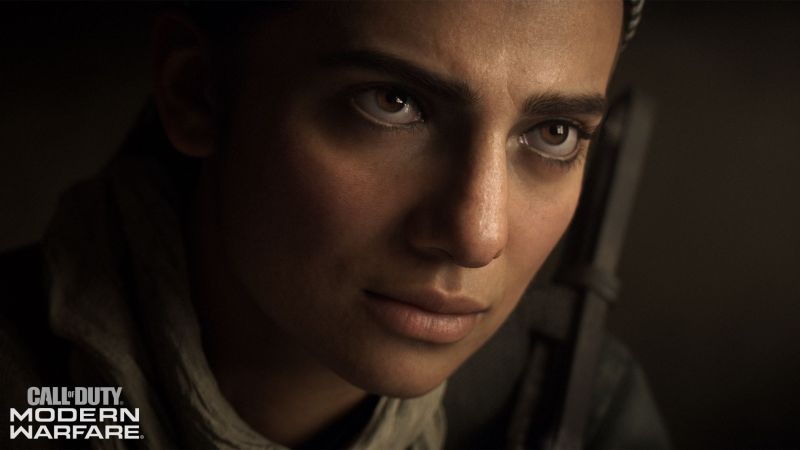
Above: Farah is one of the main characters of Modern Warfare.
GamesBeat: What I think is interesting here about that combination is going back to the notion that there are young people today who haven’t seen something like Saving Private Ryan. They haven’t read about a lot of these things in the world. Maybe they don’t know their history. They haven’t watched those documentaries that we mentioned. This might be the way they learn about something like this. It’s an interesting opportunity, and a responsibility too, that you can make all of this most memorable to people in a video game.
Kurosaki: I’ve thought about that thing precisely. If we can open people’s eyes and build empathy, if people can learn something about the world they live in through entertainment, that’s a powerful thing. Call of Duty is such a big platform. If Call of Duty has something to say, in a lot of ways that’s much more powerful than an indie game with a very small reach saying something. We have a much bigger amplification.
The analogy that someone else mentioned to me — they said that making something like this, that has a character like Farah in it, that talks about that side of war, that talks about how tough it is for these soldiers that are imperfect, that have imperfect intel, but that we expect to be perfect — if we can build that awareness and have people be entertained and have fun, then it would be like if Wal-Mart carried only organic produce. It’s a big thing like that that can make a big difference, versus something your corner farmer’s market that doesn’t have the reach.
GamesBeat: I think it’s turned out well. It’s made me think about a lot of these things.
Kurosaki: That was the hope. That was the intent.


